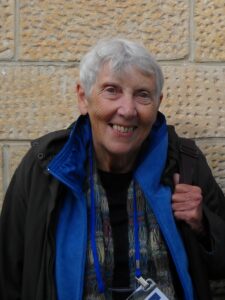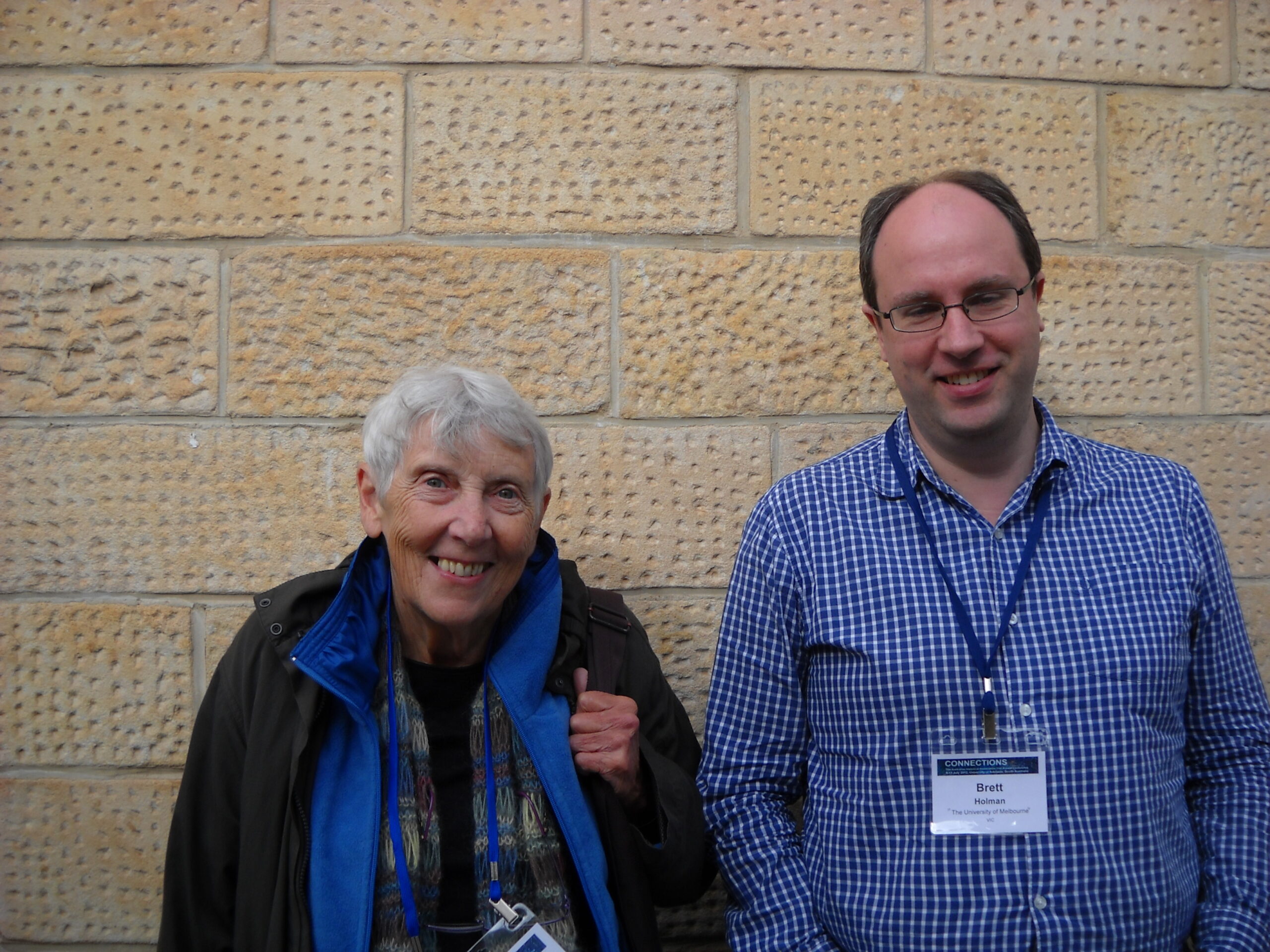
It is with sadness we heard about the passing of Australian historian Jill Roe late last week. During her life she made a significant contribution to Australian history. Through her passing Australia has lost a great contributor to our society, but her work lives on and enriches our lives.
Jill Roe is best known for her biography of Australian literary icon, Miles Franklin. Stella Miles Franklin: a biography is the book she is most renowned for, and for good reason. It is not only a literary biography, it provides a window through which we can understand what it was like for an enterprising Australian woman to work and support themselves during the first half of the twentieth century. Stella Miles Franklin took Jill Roe twenty-six years to research and write. It is both highly regarded as an academic work and an engaging read for people wanting to read it for leisure. You can read the review I wrote of this impressive book in 2012.
Jill Roe dedicated much of her life to biography. She was the chairperson of the editorial board of the Australian Dictionary of Biography (ADB) between 1996 and 2006. During this period the organisation won a substantial grant which allowed it to make the biographical entries freely available online. She is described in ‘The ADB’s Story‘ as “energetic, decisive and knowledgeable” and during her period at the helm observers noted she was an “effective negotiator”. During her life she contributed twenty entries for the ADB either as sole author or collaboratively. Just two months ago the ADB presented her with a medal for her services.
Biography was by no means Roe’s sole contribution to Australian history. She wrote about small religious groups such as the theosophists and was interested in the wider social history of Australia.
Australian historian, Ben Wilkie tweeted a fascinating interview of Jill Roe published by the Australian Humanities Review in 2004. It is a lengthy article well worth reading as it gives some insights into Jill Roe’s intellectual interests and work before the publication of the Miles Franklin biography. I want to highlight a comment she made about the religious history of Australia.
I have written quite a bit of religious history and I think that one of the problems in Australian history, not in Australia but in Australian history, is a failure to take religious behaviour and ideas seriously enough, no matter what you think of that.
That is a professional statement of the highest order. While Jill Roe no longer held the Methodist faith of her early life and did not believe in God, she still believed these histories should be told, and she did the work to ensure that happened. I admire that in her.
Roe also made some comments that will ring true to readers of this blog. She was a great believer in the importance of a “well-stocked mind”. “Reading is actually the most important thing that people can do to stock their minds”, she said. “A well-stocked mind is a well-read mind. I’m not narrow about that. If people want to read in biology, that’s fine. But they should read widely.”
I’ll leave you to find more gems in that interview for yourself.
An Aside
I was never a student of Jill Roe’s, so what I have written here is what I have learned through ‘reading widely’ both online and in books. But I did have a delightful impromptu encounter with her at a conference several years ago. It was the first Australian Historical Association conference to be covered on Twitter under the #OzHA hashtag. A small group of us who had got to know each other online were quite excited to meet in person. We were taking photos of our group when a small, lively woman asked us what we were doing. We told her we were taking photos so she immediately stood next to Brett Holman to have her photo taken. And that is how I have a photo of Jill Roe being ahead of her time, ‘photo bombing’ our group. I gained the impression that Roe was an Australian historian who loved to have fun. You can read more about that story at the bottom of my review of her Miles Franklin biography.

I mentioned earlier that Jill Roe’s work lives on. You can still become acquainted with her work by reading her books and articles. Those who are participating in the Australian Women Writers’ Challenge this year should be able to find at least one book written by Jill Roe that they can enjoy. Her Miles Franklin biography is available in over one hundred Australian libraries. The Australian Women’s History Network is seeking reviewers for their blog who can review books by Australian women historians. It would be lovely if someone could review Jill Roe’s books for that blog.
Here are three books that Jill Roe has written for you to read:
Our Father’s Cleared the Bush: Remembering Eyre Peninsula: Jill Roe’s memoirs published last year by Wakefield Press
Stella Miles Franklin: A Biography (2008): An Australian classic and available in over 100 Australian libraries. If you need more convincing, read my review.
Beyond Belief. Theosophy in Australia 1879-1939 (1986): Discover an Australia that you have not met before. A revised edition was published by Wakefield Press in 2020 under the title, Searching for the Spirit.
And if you can’t access her books, why not read the small biographies Jill Roe wrote for the Australian Dictionary of Biography? Just do an Advanced Search and do a search by author – the field is at the bottom of the page.
Obituaries
Even if you are not attending Jill Roe’s funeral, her funeral notice is worth reading for its support of Australian writers, publishers and independent booksellers.
This post by no means encapsulates Jill Roe’s entire career or Roe as a person. Find out more about Jill Roe from these obituaries:
- ‘Jill Roe, Miles Franklin biographer, remembered as ‘one of Australia’s greatest historians‘ by Daniela Torsh for the ABC. (As Professor Bridget Griffen-Foley points out Jill Roe taught history at Macquarie University for many years, but was head of department for far fewer than the thirty-six years mentioned in the article)
- ‘Remembering Jill Roe‘ by David Carment for the History Council of New South Wales
- ‘Vale Professor Jill Roe, Writer and Historian‘ by Ramona Koval on her website. This includes a transcript of the interview Ramona Koval did with Jill Roe in 2008 for Radio National about the Miles Franklin biography.
- ‘Vale Jill Roe A.O. (1940-2017)‘ by Lisa Hill, book blogger at ANZ LitLovers LitBlog. Jill Roe was a writer who appealed to a wide range of readers. Lisa’s post is testament to that.
- Beverley Kingston, ‘Obituary: Jillian (Jill) Roe AO, 1940-2017‘, Labour History, no 112, (May 2017), pp. 191-193.
- ‘Vale Jill Roe’, Macquarie Matters.
- Desley Deacon, ‘Jill Roe obituary – Desley Deacon‘, The Australian Historical Association, 13/2/2017.
I will continue to update this section with relevant links as more articles come to hand.
So much of my reading and blogging concerns Miles Franklin that Jill Roe will always be important to me. However, I had not realised before reading these obituaries that her field was history rather than literature.
Jill Roe’s work is a good example of the slippery nature of disciplinary boundaries. I draw on the work of scholars of literary history. In fact I have just finished reading George Fussell’s enduring work, The Great War and Modern Memory which explores the themes in WWI literature. It is helpful for interpreting what the men wrote in their diaries and letters.
I have found that researching areas that straddle disciplinary boundaries is very fruitful. There is much that one discipline can contribute to the understanding of another discipline. Also those topics are most likely to be neglected so it is fruitful work.
I certainly find it helpful (as well as interesting and entertaining!) following history and biography as well as literary bloggers.
Thank you for the mention, Yvonne. Roe’s death is such a loss, it is hard to express the sense of sadness that I feel. I never met Jill Roe, but I feel that I know Miles Franklin because of her, and that is such a gift.